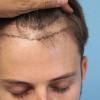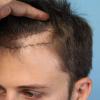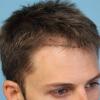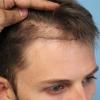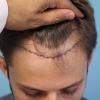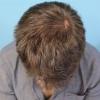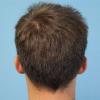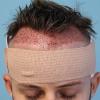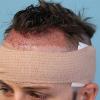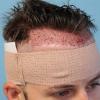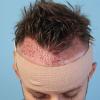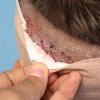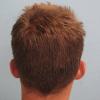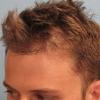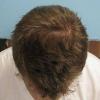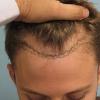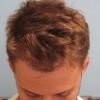About
I first started noticing that my hairline seemed to be receding when I was around 26/27 years old. And in true dramatic hair loss fashion, it made me sick to my stomach. Physically... And I wanted to cry. (Like I said, dramatic). I was stressed to the max. Gray hair, I could handle. But BALD? Hell no. I had always told myself that I wouldn't have to worry about it... After all, my grandfather on my mother's side had hair, so I was safe and sound from going bald, right? RIGHT??
I started asking a few close friends if they thought it was happening, or if I was making this all up in my head. And one by one, each of my friends assured me that I was fine. "Everyone's hair is thinner there in the front," they'd say. "Hairlines change as you get older and mature. That's all that's happening." "Don't worry about it. You're fine." I even asked my barbers, and they also tried to sugarcoat it and tell me that nothing was wrong. It was normal. I couldn't have a child's hairline forever. But I knew it was thinning... And I hated it.... And I didn't think there was anything I could do about it.?I had mastered the art of fixing and combing and blowdrying and styling my hair ever so carefully so that no one (but me) could notice.... But it was discouraging, and something that really, REALLY bothered me.?
Fast forward to the summer of 2014. After some research, I found Dr. Parsa Mohebi in Los Angeles and went to see him. He confirmed what I knew to be true. My hairline was receding, but he had a solution. He was honestly one of the nicest, most personable, knowledgeable doctors I have ever met and his staff was professional, kind, informative, and patient. Through some additional research and well over a hundred questions, I took the plunge and had the transplant on July 31st of this year (2014). I couldn't have been more happy with the entire process and I am looking forward to watching my hairline transform.?
I will be documenting my experience with Dr. Mohebi thus far and keeping a log of my progress. If anyone has any questions regarding my experience up to this point, just let me know. Pictures and more details to follow.?
Patrick
My Surgical Treatments to Date
I had the FUE procedure done on July 31st of 2014 by Dr. Parsa Mohebi. (2,000 grafts)
My Non Surgical TreatmentsFinasteride (generic Propecia)
Bald Class

Norwood stage 2
There is a slight recession of the hairline around the temples. This is also known as an adult or mature hairline.
I've always said that there's a very fine line between vanity and insecurity. I'd struggled with low self-esteem/insecurity ever since I was a child. However, moving into my mid 20s, I started to come into my own little by little and grew more and more secure in who I was. Then around 26, I started noticing what I feared to be a receding hairline. And over the next 4 years, I saw it increase, little by little. And it made me very insecure. I hated it. I was in denial for quite some time and tried to convince myself that it wasn't happening. I had "good hair days" where it wouldn't be as noticeable, and I worked really hard on mastering just the perfect cut and style so that it wouldn't be noticed. And lucky for me, no one did. But I noticed it - big time - and it drove me bananas. I would obsess about it tirelessly and literally have nightmares about my hair falling out. (DRAMA!) I had no idea up to that point how much of my identity was tied up in my hair - and it sounded so silly. I had otherwise become a strong, mature, confident young man, but the thought of a receding hairline shook me up big time. During this time, I became obsessed with other men's hairlines. I would compare mine to other guys' and see how I measured up.... I would think about it countless times throughout the day and really thought there was nothing I could do about it.
I tried every shampoo imagineable. I tried massaging my scalp to increase bloodflow. I stopped wearing hats. I stopped using certain styling products. I took vitamins and supplements and had my hair cut every two weeks. (The longer it got, the more noticeable it was.) I was afraid of Rogaine and wanted to avoid drugs.
Since right before my surgery, I began taking Finasteride 1.25mg (generic Propecia) daily, and continue to do so. I can't speak with certainty to how it's worked, though I like to think that it cut down considerably on my shock loss. I don't believe I've lost all the grafts that were originally transplanted and I've had no negative side effects from the drug at all.
Based on my experience thus far, I couldn't be happier with my decision and the results I've seen up to this point. It will still be a few more months before I really start seeing the hair grow back in, but everything seems to be right on schedule and is happening just as Dr. Mohebi predicted. And call me crazy, but I'm convinced that I already have more hair than I did before the transplant. Who can say for sure, but it may be due to the Finasteride reducing the amount of shock loss I experienced.
In addition to Finasteride, I also take Saw Palmetto and a B-Complex vitamin daily. Not sure if it helps, but I figure it can't hurt.
I'm now very optimistic about the future of my hair, as opposed to pre-surgery, when I was constantly stressed out about my receding hairline. I used tonobsess about it way more often than I should have, so I'm looking forward to being able to wash/style my hair without worrying about going bald and covering up the receding hairline. Not to mention how nice it'll be to go swimming without the fear my receding hairline being exposed to everyone. I'll have more to report about the changes the surgery has brought to my life several months down the road.
Do your research and be proactive about taking care of your hair loss. A solution is possible! Find a doctor that you trust and feel comfortable with and that you believe has your best interests at heart. And ultimately, follow your gut. That's what lead me to Dr. Mohebi - the entire process of dealing with him and his staff felt "right" to me, and something told me that I was in very good hands. I never once felt like he was trying to "sell" anything to me and force anything on me.
When choosing a doctor, one thing that stood out for me about Dr. Mohebi was how hands on he is with every single one of his patients. His office doesn't perform more than one surgery a day so that the doctor himself is able to perform the surgery on each patient, with his technicians simply there to assist him. That made me feel very comfortable that they're not willing to sacrifice quality for more patients/more money. Many offices don't do this and the doctors merely serve to oversee the procedures done by the technicians. Just something to be aware of.
Also, ask questions! Don't be afraid to ask as many questions as you need to. It's a big commitment and investment, so do your due diligence and ask whatever questions you have, no matter how silly you think they may be. I can't even tell you how many times I called Dr. Mohebi's office asking question after question, even up to 2 days before surgery while I was dealing with pre-operation jitters. And not one single time did the staff ever make me feel like a nuisance. They were kind and patient and willing to answer all my questions with a smile. Major, major points right there.
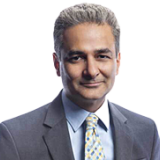
 Elite Coalition Member
Elite Coalition Member


